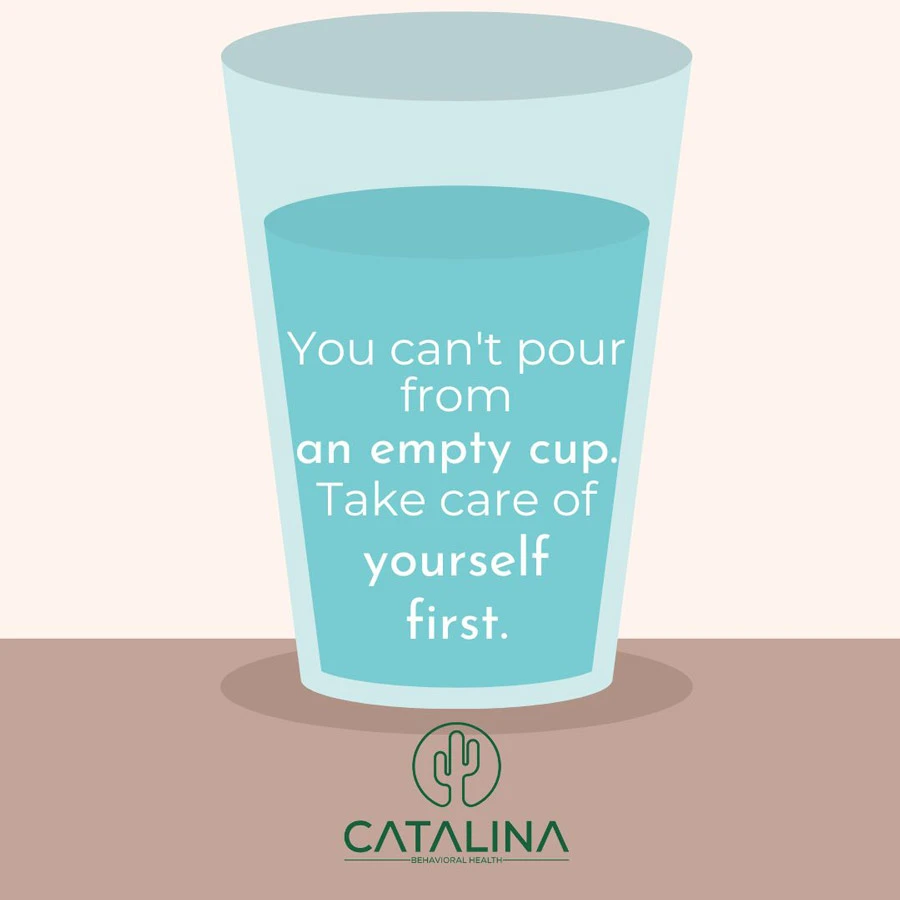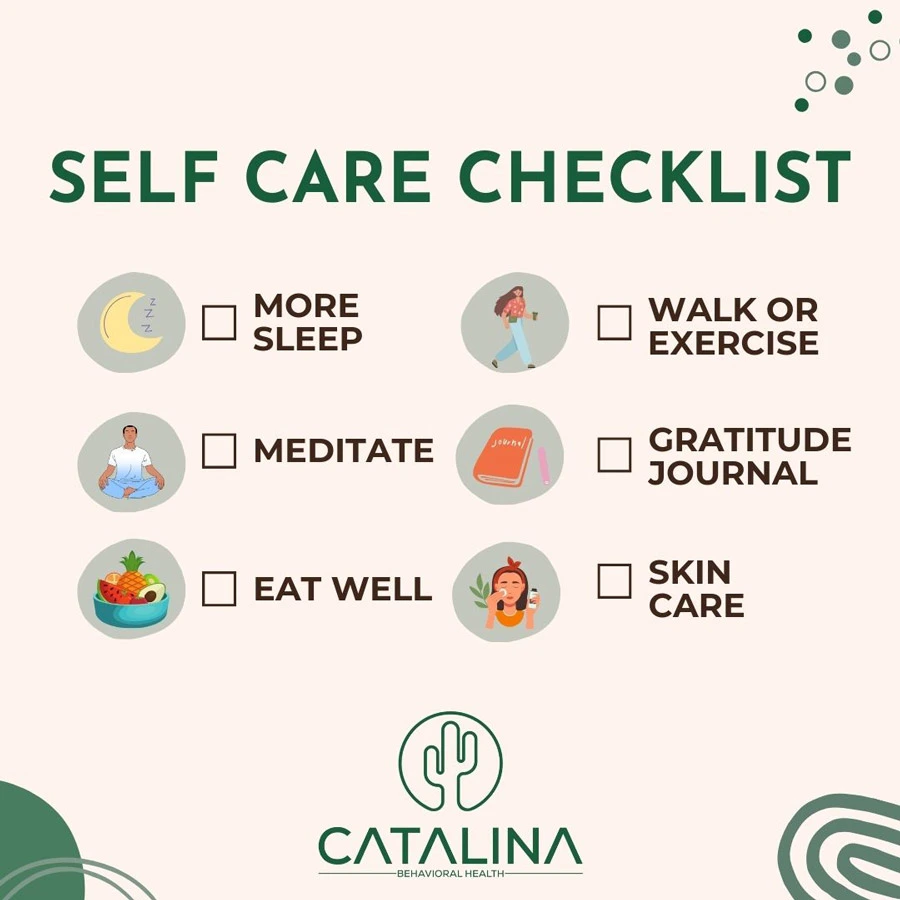Using a Daily Checklist for Mental Wellness and Happiness
Do you often feel rushed or overwhelmed by the realities of the daily grind? If your answer is a resounding “yes,” then our mental health self-care checklist is a wonderful tool that reminds you to take a few minutes to look after both your body and mental health each day.
The importance of taking care of yourself is paramount to your family. If you don’t spend time on your well-being, you will eventually burn out trying to juggle commitment to loved ones, career or school, and your never-ending to-do list.
Catalina Behavioral Health, one of Tucson, Arizona’s best mental health and rehabilitation facilities, has witnessed the disheartening outcomes that can come when someone fails to manage stress or seek emotional support when necessary.
But here’s a silver lining: Most people can protect their mental health by setting daily self-care goals and making them a priority. Like all skill-building, it does take practice.
We invite you to take a moment of self-care time right now and keep reading this guide. You will learn how you, too, can start your self-care journey with our healthy habits checklist.
Taking Care of Your Physical and Mental Health Is a Critical Function

Right now, you might be scratching your head and wondering: What does a self-care checklist have to do with staying well?
You might just be surprised to understand the depth of overlap between the health benefits you receive when you take care of your physical, emotional, and mental health.
Our brain is something like the CPU that runs a computer. It directs all your body’s operations, including thoughts, breathing, heartbeat, and emotional responses.
Think about what happens when something goes wrong on your computer. The screen freezes, apps crash, or the response time slows to a crawl. The same thing happens when you neglect self-care for your brain. You can lose focus, start believing negative self-talk, or experience less sleep quality. Your overall wellness starts to break down. It’s a signal that it’s time to create a new plan to get things back in order.
Just as a computer needs maintenance to keep all systems running smoothly, so does your mind and body. That’s where our daily mental health self-care checklist comes in.
Daily Self-Care Checklist for Your Mental and Physical Health

This mental health self-care checklist gives you a few of the best ways of spending time on your mental and physical well-being. You don’t need to try all of them; pick one or two that appeal to you and give them a try.
With time and practice, you will become your best self by trying just a couple of the strategies you’ll find on this self-care checklist.
1) Eating a Balanced Diet for a Healthier Body and Brain
You have probably heard since childhood that “you are what you eat,” and understand that food is fuel. Eating nutritiously impacts your quality of life, yet many struggle with eating well.
When you make common-sense changes to your eating habits, start making small changes. Cut out sugary treats the first week. The next week, swap out processed meats for some delicious grilled fish that will better support brain health.
You can overhaul your food habits before and make tremendous improvements in your wellness. It takes less effort than you might think.
Confidential Trauma and PTSD Assessment at Catalina
2) Get Enough Sleep
Are you fatigued, tired, irritable, or experiencing a mid-day lull? You probably don’t get high-quality sleep at night.
A brain that receives too little sleep is sluggish as it tries to direct all your body’s processes. Most people don’t pay much attention to sleep hygiene and lack a nightly routine to signal to the body that it’s time to rest. Limit screen time before bed, retire at the same time each evening, and arise at the same time each morning to reset your body’s internal clock.
Note that ongoing sleeping issues can signify challenges with emotions or overall well-being. Talk to a therapist if you think you have some other cause for your sleeplessness.
3) Take a Long Walk (or Your Other Favorite Daily Exercise)

Multiple studies confirm that exercising on a daily basis is a powerful form of both physical and emotional self-care. That’s because your body releases natural mood-enhancing chemicals called endorphins when you exercise. You’ll feel better emotionally and become physically healthier.
It doesn’t matter what you do. Take a nature walk, practice breathwork, follow a yoga video on YouTube, or jump on the trampoline with your children. The key to success is to get up and exercise as you wish. It helps you stick with your plan if you make exercising a ‘date’ with loved ones or friends.
4) Master Mindfulness or Try Guided Meditation
Mindfulness is a key tool for anyone who hopes to restore calm during moments of anxiety. It’s the ability to be present and practice self-compassion without judgment in the here and now. This skill can take a while to develop and can be hard to understand.
To get started, search online for a guided meditation video and follow along with the instructor. You will also probably learn some helpful breathing exercises as you follow along.
You will quickly understand how helpful meditation and breath control can be, especially during your morning routine. It really helps you focus and prepare for the upcoming day.
5) Glow Up Your Skincare Routine
Feeling unwell can affect the elasticity and texture of your skin. But when you look your best, you support better feelings, including more self-esteem and greater confidence. You’ve heard the phrase, “Be happy in the skin you’re in.” You have the power to address your key concerns and make that trite phrase your true reality.
A skincare process only takes five minutes a day. Take the time to maintain your skin – you deserve the glow!
6) Write in a Gratitude Journal

We saved journaling as the last item on our mental health self-care checklist because it’s so powerful for your emotional health. You create a safe, confidential space to create lists to reach your goals, reflect on your relationships, or just pour out your heart freely.
When you practice gratitude journaling, you discover an excellent tool for alleviating the stress of everyday life. Most people feel indescribable relief when they write the words and release them into the journal’s pages.
Do You Have Specific Mental Health Needs or Concerns?
This daily self-care checklist offers several amazing ways to spend time and enjoy a more balanced life.
An informal peer support resource some former clients have found helpful can also be found in the form of Emotions Anonymous meetings, both online and IRL. While these self-care strategies can be helpful, they are not a substitute for professional support for specific needs. If you have clinical questions about your emotions, mental wellness, or issues with physical health, see a licensed professional.
Up To 100% of Rehab Costs Covered By Insurance
Call Catalina for Additional Mental Health Support Options
Call the team at Catalina Behavioral Health if you believe you need help to cope with trauma, stress, addictions, or other mental health challenges. We can create a customized program to help you get to the heart of your issues.
Give our caring staff at Catalina a call today; we can help you find the peace and healing you need.







